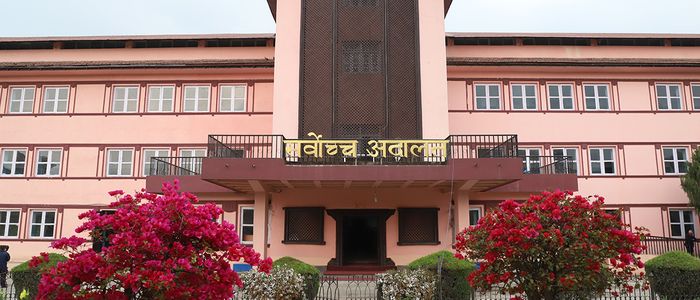
In the hearing that began today in the Supreme Court (SC) on the case of dissolution of House of Representatives (HoR), advocates demanded the case be heard at extended full bench rather than constitutional bench. Among 13 writ petitioners, 11 persons registered application for conducting the hearing in the extended full bench.
As soon as the constitutional bench comprising Chief Justice Cholendra Shumsher JB Rana and Justice Hari Krishna Karki, Bishwombhar Prasad Shrestha, Anil Kumar Singha and Tej Bahadur KC began hearing on Wednesday, the voices were raised for the extended full bench hearing.
Immediately after the beginning of the bench, senior advocate Raman Shrestha said, “Based on the precedents and Supreme Court jurisdiction, this case must be taken to the extended full bench to determine the jurisdiction of constitutional bench and other bench.” He reminded that once the SC Regulation contradicts or the Chief Justice wants, there is the provision that the cases are conducted hearing in the comprehensive full bench.
In response to senior advocate Shrestha’s view, CJ Rana questioned, “Why to take it to the comprehensive full bench?” Again, Shrestha argued that taking it to extended bench would ensure prompt and thorough pleading.
Similarly, another senior advocate Shambhu Thapa said, “We want this case be pleaded and heard in the full bench; it is indeed the wish of common people too.”
Senior advocate and former attorney general Mukti Pradhan also suggested the SC that interpretation of Constitution would be more comprehensive in the extended full bench than in a bench having only five Justices.
Similar argument was made by senior advocate Dinesh Tripathi. “The hearing must not be delayed; citizens have trust in the judiciary, so it needs to be taken to the extended full bench.”
There is a provision that there will be five or more than five Justices in the extended full bench. This bench is formed once the full bench issues order or report warranting the need of extended full bench reasoning the interpretation of law and legal principles.
The extended full bench is formed also in the condition that needs uniformity in the differing interpretations and principle from two benches.
Meanwhile, senior advocate Tripathi questioned whether Justice Hari Krishna Karki, who was former Attorney General, appointed by Prime Minister KP Sharma Oli, could involve in the present dispute.
“I do not have qualm to listen to your hearing and decision and do not have question over your competency. We should take the case to extended full bench rather than the present bench comprising five justices. But, Hari Krishna Karki was the Attorney General appointed by PM Oli before he became a Justice.”
However, in response indicating advocate Tripathi, CJ Rana said, “I’m also the Chief Justice that PM Oli appointed. Doesn’t it apply in my case too?”
Again, another advocate Thapa reminded that Constitution has the provision that CJ should compulsorily involve in this issue/case, there’s no alternative.”
Then, CJ Rana announced that Justice Karki would not involve in this bench.
Now, the next schedule will have the pleading whether to continue the case in the present constitutional bench or take it extended full bench, which will pave way for the debate in the main dispute.
Source : RSS,






